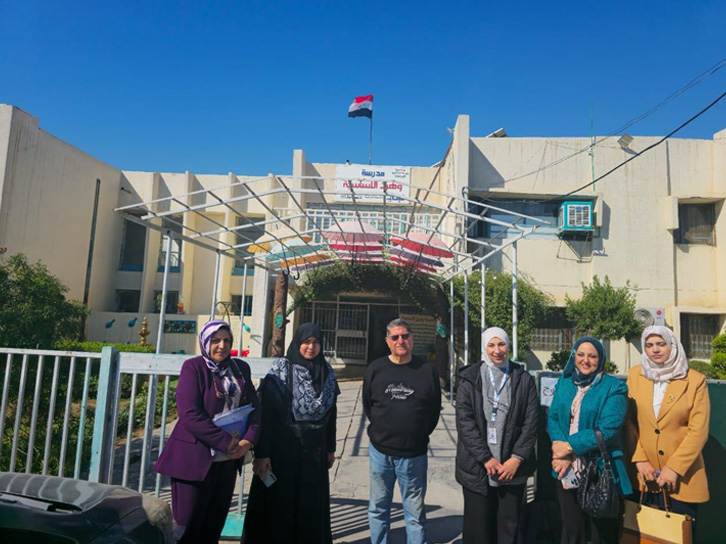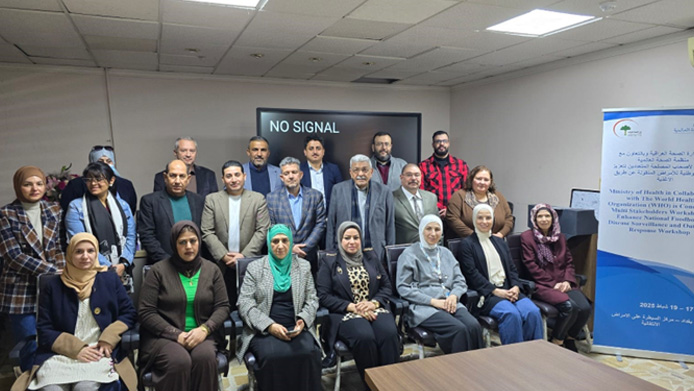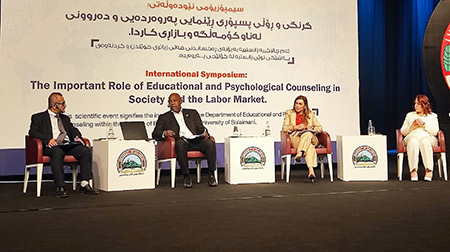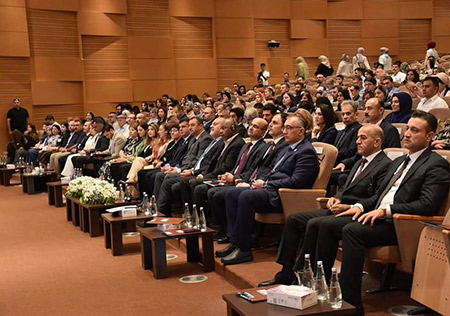Iraq launches the Global School-Based Student Health Survey
 19 March 2025, Baghdad, Iraq – The Ministry of Health (MoH), in collaboration with the Ministry of Education (MoE), has commenced fieldwork for the Global School-Based Student Health Survey (GSHS).
19 March 2025, Baghdad, Iraq – The Ministry of Health (MoH), in collaboration with the Ministry of Education (MoE), has commenced fieldwork for the Global School-Based Student Health Survey (GSHS).
The standardized survey, developed by the World Health Organization (WHO) in partnership with the US Centers for Disease Control and Prevention, collects data on adolescent health and well-being to provide a foundation for evidence-based policy development and targeted interventions. The survey will be conducted in selected schools across Iraq’s governorates, with trained data collectors engaging students in a structured and confidential manner.
Highlighting the commitment of stakeholders to ensuring the successful execution of GSHS, technical officers from WHO, UNICEF, MoH and the Baghdad Al-Karkh Health and Education Directorates carried out a field visit to oversee the initial phase of GSHS implementation.
WHO is committed to supporting the initiative, which focuses on assessing key health behaviours and risk factors among school-aged children and adolescents and emphasizes the importance of a multisectoral approach to addressing adolescent health challenges. By working together, stakeholders can equip young people in Iraq with the knowledge, resources and support to lead healthier lives.
Fieldwork will continue over the coming weeks and the findings are expected to contribute to Iraq’s national strategies on adolescent health and education. MoH and MoE, in collaboration with WHO, the United Nations Children’s Fund (UNICEF) and the United Nations Population Fund (UNFPA), will ensure the smooth implementation of the Survey and the accuracy of the data collected.
Iraq strengthens foodborne disease surveillance and response
 Participants at the national meeting to develop guidelines for foodborne disease surveillance and response6 March 2025, Baghdad, Iraq – A national meeting, convened between 17–19 February 2025, brought together leading experts and stakeholders to develop comprehensive national guidelines to improve the detection and response to foodborne disease outbreaks.
Participants at the national meeting to develop guidelines for foodborne disease surveillance and response6 March 2025, Baghdad, Iraq – A national meeting, convened between 17–19 February 2025, brought together leading experts and stakeholders to develop comprehensive national guidelines to improve the detection and response to foodborne disease outbreaks.
The Ministry of Health, in partnership with the World Health Organization and with the involvement of the Ministry of Agriculture and the Central Organization for Standardization and Quality Control, collaborated to organize the meeting.
The initiative underscored the government’s commitment to safeguarding public health and promoting food safety in Iraq.
In her opening remarks, Director of Centres for Disease Control and Prevention (CDC Baghdad) Dr Sinan Ghazi stressed the importance of a coordinated approach to tackling foodborne diseases that pose a significant threat to public health and the economy.
“Our goal is to develop a unified framework that will enhance our ability to detect and respond to foodborne outbreaks,” she said.
The meeting included sessions presented by experts from the WHO Regional Office for the Eastern Mediterranean and the International Food Safety Authorities Network (INFOSAN) secretariat. The Food Safety Department of the Qatari Ministry of Public Health and the Jordan Food and Drug Administration shared their insights and experience in promoting cross-sectoral collaboration for early detection and response to food-safety incidents.
The meeting established a foundation for developing a comprehensive national guideline, improved coordination, and strengthened Iraq’s preparedness for foodborne disease outbreaks. Concluded with a tailored work plan for 2025-2026 to address specific needs stemmed from the assessment and ultimately enhance the food safety capacity scores reported through the International Health Regulations (IHR).
WHO Iraq highlights the important role played by educational and psychological counseling

6 October 2024, Sulaymaniyah, Kurdistan Region, Iraq – The World Health Organization (WHO) took part in the International Symposium on the Importance and Role of Educational and Psychological Guidance in Society and the Labour Market, held last month in Sulaymaniyah, Kurdistan Region of Iraq.
The event, which brought together stakeholders from the health, education and humanitarian sectors, focused on the integration of mental health support in primary health care and the educational system, and on developing mental health support for the workforce.
The symposium highlighted the importance of collaborations between WHO and the Ministry of Health, local authorities and non-state actors to enhance mental health services. Such partnerships help embed WHO mental health tools within primary health care services and educational institutions, ensuring that effective mental health support is available across the country.
Two Symposium sessions were dedicated to the professional development of university and college educators, underlining the importance of psychological counseling in fostering a healthy and resilient workforce. In the second session, WHO Representative and Head of Mission in Iraq Dr Georges Ki-Zerbo reiterated WHO’s long-term commitment to integrating mental health into the health and education sectors not just in response to crises but as an essential pillar for rebuilding and stabilizing communities.
“Mental health is central to life and underlines every stage of human development,” said Dr Ki-Zerbo.

“In collaboration with our partners, WHO is equipping Iraq’s health and education sectors with the tools and competencies to address mental health challenges. Our focus on integrating mental health into primary health care and schools reflects our commitment to creating a more resilient and supportive society, ensuring that no one is left behind.”
Drawing attention to the crucial link between mental health and Iraq’s broader developmental goals, and with the Sustainable Development Goals in particular, Dr Ki-Zerbo underlined how investment in mental health services is not just about recovery but about reinforcing sustainable societal progress.
He pointed to WHO’s successful integration of global mental health standards into local contexts, citing Iraq’s humanitarian and primary health care services, where WHO-supported mental health tools are being used to address gaps and strengthen the capacity of health care professionals and educators, as an example.
“As part of its ongoing strategy, WHO Iraq continues to collaborate with academic institutions and local authorities to advance workforce development in Iraq. Through targeted pre-service and in-service training programmes we are empowering educators and counselors to provide the psychological support needed to foster mental resilience and preparedness in the education system and labour market. My gratitude goes to the authorities in Sulaymaniyah, the event organizers and co-panelists for their efforts and collaboration.”
Workforce development and the utilization of WHO mental health tools have a single goal – to help build a healthier, more resilient society that meets the mental health challenges of today and tomorrow.
For more information, contact:
Ajyal Sultany
Communications Officer, WHO Iraq
Email:
Mobile: +9 64 77 40 89 28 78


